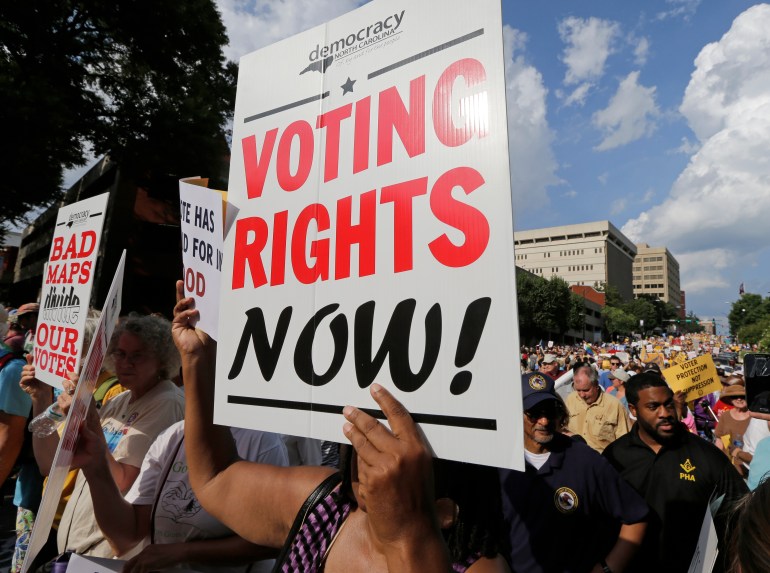In the days and months leading up to today’s presidential primary in Georgia, activists have been on the ground in African American neighborhoods across the state working to prevent a rollback of voter rights that they say harkens back to the Jim Crow era.
After record voter turnout flipped the state from deep red to barely blue in the 2020 presidential elections, Georgia has become the epicentre of a GOP campaign to effectively deny African Americans’ access to the ballot box in the American South.
Georgia’s Republican legislators passed a melange of laws in 2021 intended to restrict voting in the state, strengthening voter identification requirements for absentee balloting, reducing the availability of drop boxes, and expanding the legislature’s authority in elections. Mirroring arguments made by GOP operatives nationwide, Republicans in Georgia contend that the measures are necessary to combat voter fraud. But Democrats and voting rights experts have countered that there is no statistical evidence of widespread voter fraud anywhere in the country, and that the reforms target African Americans who overwhelmingly support Democratic candidates and can therefore determine the outcome of elections when they turn out in large numbers, as was the case in Georgia in the 2020 presidential election.
Cliff Albright, co-founder of Black Voters Matter and executive director of the Black Voters Matter Fund, said that Republican lawmakers across a wide swath of the former Confederacy have been redrawing the borders of election districts to favour their own party (often called “gerrymandering”), purging voters from the rolls and rewriting laws to effectively disenfranchise African Americans. Alabama’s House of Representatives last week approved legislation that would make it a felony for anyone in the state to receive help in filling out an absentee ballot from anyone who has not been designated by elections officials or is not a relative, or co-inhabitant.
Under the proposal, anyone convicted of the crime could be sentenced to as many as 20 years in prison, on par with sentencing guidelines for manslaughter and statutory rape.
And the Republican-controlled Mississippi legislature has repeatedly refused to repeal a Draconian provision in the state constitution, written in 1890, that disenfranchises anyone convicted of a catalogue of crimes that includes, car theft, robbery, perjury and receiving stolen goods.

White backlash
Legal scholars and advocates have said that this wave of voter suppression is not isolated, but rather part of a broader white backlash that is animated, in large measure, by growing economic woes, and the feeling that people of colour – African Americans especially – are gaining ground and may soon surpass whites in terms of social status and economic prosperity. In this way, many academics have said, renewed efforts to suppress the Black vote are related to the mostly white rioters who stormed the US Capitol on January 6th, 2021 in an effort to overturn the presidential election, and the litany of young, white gunmen who have waged racially motivated attacks in recent years on African American parishioners and shoppers.
A peer-reviewed study published by the Brennan Center for Justice in 2022 found that the US is amid “an unprecedented wave of anti-voter legislation introduced and passed across the country.” Continuing the report’s author wrote, “In 2021, at least one bill with a provision restricting access to voting was introduced in the legislature of every state except Vermont. By early May of this year, nearly 400 restrictive bills had been introduced in legislatures nationwide,” representing a nearly seven-fold increase over 2020.
“There is a true backlash towards Black and brown folks” Melanie Campbell, president and CEO of the National Coalition on Black Civic Participation told Al Jazeera. “That makes it [this election year] very different … It’s a very toxic environment.”
‘Gaza will hurt if they don’t change course.’
Campbell and Albright said that their organisations have mounted massive “ground games” to offset the campaign of voter suppression, going door to door to educate and register voters, staffing phone banks, sending text messages and even touring Black neighbourhoods in the South by bus to shine a spotlight on the wide range of material deficits on the ground.
Scholars have said that suppressing the African American vote, however, is not a bug but a feature of US democracy, dating back to the era known as Jim Crow. Mobs who set upon African American neighbourhoods in Atlanta in 1906, for example, did so as part of a campaign strategy devised by a gubernatorial candidate. The Atlanta riot was, in fact, informed by one in Wilmington, North Carolina eight years earlier when Democratic party operatives organised a coup to overthrow a populist political party that enjoyed broad support from Black male voters.
Similarly, the GOP’s efforts today are motivated by political gain, Albright said, although he acknowledged that the Democratic party’s leadership can at times be its own worst enemy. Speaking of Black activists working to turn out the Black vote, he told Al Jazeera:
“We get almost zero resources [from the Democratic National Committee]. They’ve got their favourite groups and white, male consultants. And Black groups end up contracting the same white consultants.”
Moreover, he said that the GOP’s efforts to suppress the Black vote is only a part of the Democrats’ problems.
“Young people don’t have much confidence with [Biden].”
And noting the 100,000 Michigan voters who chose the “uncommitted” option in last month’s primary to protest Biden’s failure to stop Israel’s siege and blockade of the Gaza Strip and, increasingly, the West Bank, Campbell said of the Biden campaign:
“Gaza will hurt if they don’t change course … Biden could lose the election.”

